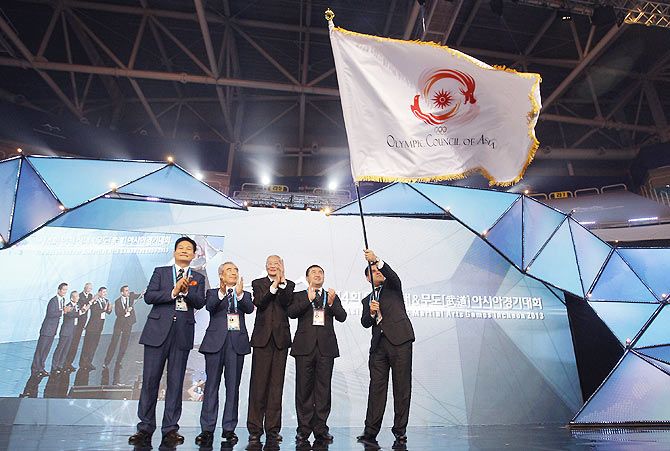
An array of Olympians and stars of sports niche and new arrive in the South Korean city of Incheon for the 17th Asian Games this month, bringing together some 10,000 athletes for a 16-day multi-sport spectacular second only in scale to the Summer Olympics.
From weightlifting to wushu, rowing to rugby sevens and swimming to sepaktakraw, the Games will showcase elite Asian talent in 28 Olympic and eight non-Olympic sports from September 19 to October 4, with a total of 439 gold medals up for grabs.
While China are certainties to top the medal count for the ninth straight Games, South Korea have set an ambitious target of 90 golds, though the hosts would probably settle for less as long as they finish above fierce rivals Japan.
India, perennial underachievers in world sport, are determined to improve on the 14 golds they won four years ago in Guangzhou, while Malaysia, Singapore and Thailand will battle it out for bragging rights in Southeast Asia.
Four years on from Guangzhou's glitzy Games, which by some estimates left the city in debt to the tune of $32 billion, South Korea has spent a reported 1.2 trillion won ($1.2 billion) on construction costs to host the event for a third time.
Operational costs are expected to run to 480 billion won.
The huge costs of hosting the multi-sports event may make countries think twice about bidding for future Games.
Vietnam quit as 2019 hosts amid concerns it would not prove financially viable. India and Malaysia both decided against throwing their hats into the ring to host the event, citing financial concerns.
Indonesia looks to be the only candidate willing to step in and the Olympic Council of Asia (OCA) is announce its decision on the host at its general assembly in Incheon later this month.
Chinese powerhouse
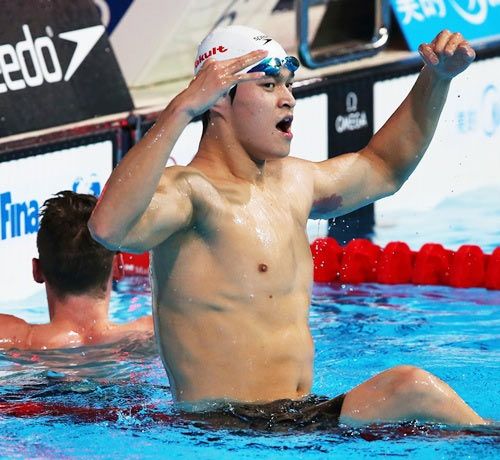
Troubled by few financial concerns, China, as expected, is sending the biggest delegation to Incheon with 899 athletes and will once again hope to use the Games as a springboard to launch the careers of future Olympic champions.
Swimmers Sun Yang and Ye Shiwen both made their big breakthroughs in Guangzhou by each winning two gold medals before repeating the feat at the London Olympics in 2012.
The double Olympic champions will form the core of China's powerful swim team, who will look to grab more than half of the 38 swimming golds on offer in Incheon.
The Chinese are also likely to dominate diving, gymnastics, table tennis and badminton and field heavy favourites across many of the 36 sports in Incheon.
Among the sports left off the Incheon programme from the Guangzhou Games were dragon boat racing and board games, which the Chinese had a virtual monopoly on.
While organisers will hope to keep the focus firmly on sport, Beijing's strained relations with some of its Asian neighbours over territorial disputes in the East and South China Seas could add spice to the competition.
Beijing has been involved in disputes with Vietnam, the Philippines and other Southeast Asian countries over claims in the South China Sea, and tensions have also been heightened with Japan and South Korea over Beijing's declaration of an air defence identification zone.
South Korean men have a bigger prize at stake
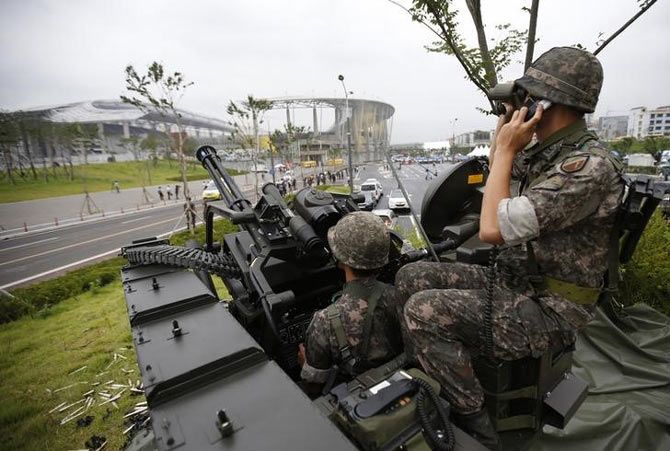
While 'sports diplomacy' can sometimes help smooth bumpy relations between countries, Lee Tai-hwan, director of Seoul's Sejong Institute, said it would be difficult to expect any concrete improvements arising from the Asian Games.
"While sports events like this can act as a catalyst, the Asian Games won't be a watershed moment to resolve conflicts and improve the ties in the region," he told Reuters by telephone.
"Although we cannot completely rule out the positive effects the Games would have on the geopolitical situation in Asia, they won't be big or long-lasting."
For most of the continent's athletes the lure of an Asian Games gold medal rests in the fame and fortune it often brings, but for South Korean men there is a bigger prize at stake -- an exemption from two years of military service.
South Korea is technically still at war with its northern neighbour after the 1950-53 Korean War ended in a truce and not a peace treaty. It requires all able-bodied men to serve around two years in the military.
However, in a bid to foster elite athletes South Korea offers exemptions to those winning gold at the Asian Games or a medal of any colour at the Olympics.
'We should refrain from attaching too much meaning to North Korea’s participation'
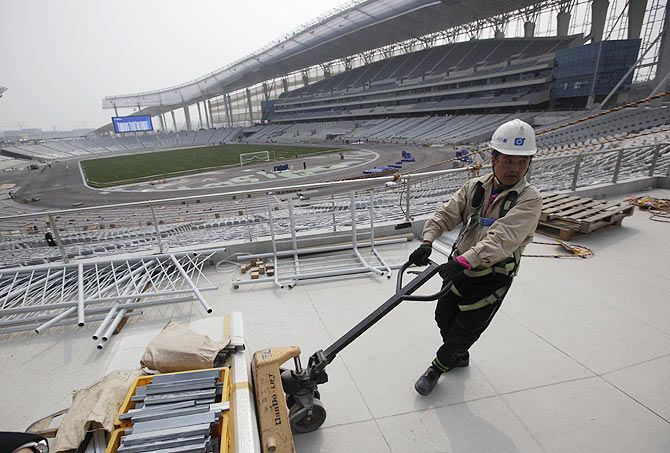
Hosting the Games for a third time after Seoul in 1986 and Busan in 2002, South Korea have gold medal favourites in Park Tae-hwan (swimming), Son Yeon-jae (rhythmic gymnastics) and Oh Jin-hyek (recurve archery).
They also have high hopes in shooting, fencing, judo and taekwondo, as well as team events such as baseball and men's and women's soccer.
North Korea will also send athletes to the Games but negotiations on its participation have been tricky.
Late last month the North announced it had decided not to send a squad of 350 cheerleaders to Incheon and accused Seoul of "abusing sacred sports and cultural exchange" for a "sinister political purpose".
Yang Moo-jin, professor of University of North Korean Studies, said there was no undercurrent of warming relations to the North's participation in the Asian Games.
South and North Korea marched together at the opening ceremony of the 2000 Sydney Olympics and there has been talk about fielding joint teams over the years, but the relationship has deteriorated.
"This time, North Korea is making it clear ... it is only attending the event as a member of the Asian Games," added Yang.
"So we should refrain from attaching too much meaning to North Korea’s participation."
First time Japan picked two women to undertake the duties at a Games
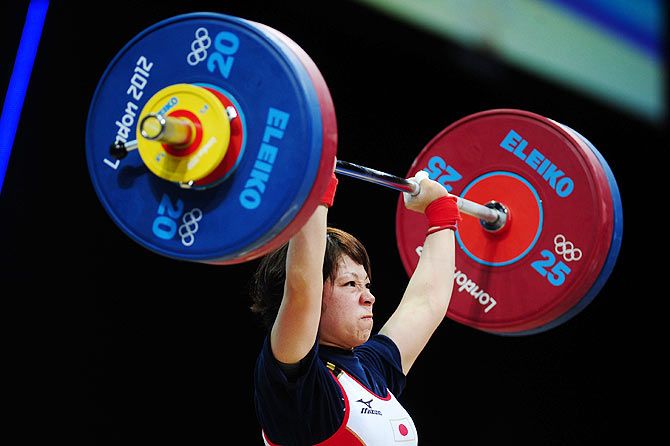
While talks are still ongoing between the two Koreas over the details of the North's delegation, Pyongyang is expected to send around 150 athletes to Incheon.
The North, which rewards its top athletes with apartments, cars and cash for raising the country's image on the world stage, could win several gold medals in weightlifting after earning three at the London Olympics two years ago.
Tokyo has won the right to host the 2020 Summer Olympics but Japan won only seven gold medals at the London Games two years ago and have finished third in the medal standings behind China and South Korea at the last four Asian Games.
The Japanese are sending 716 athletes to South Korea with their swim team expected to spearhead the gold medal hunt following their seven wins at the Pan Pacific Championships in Australia last month.
Weightlifter Hiromi Miyake will act as captain and archer Kaori Kawanaka the flag bearer, the first time Japan have picked two women to undertake the duties at an Olympic or Asian Games.
While the powerhouses of Northeast Asia slug it out for the gold medals, the smaller nations will also be vying to get on the podium, with only Bhutan, Maldives and Timor-Leste yet to win an Asian Games medal of any colour.
Perhaps they will find success in some of the less mainstream sports at the Games, such as ten pin bowling or sepaktakraw, where players use their feet, knees, chest and head to send a rattan ball into the opposition court.













 © 2025
© 2025